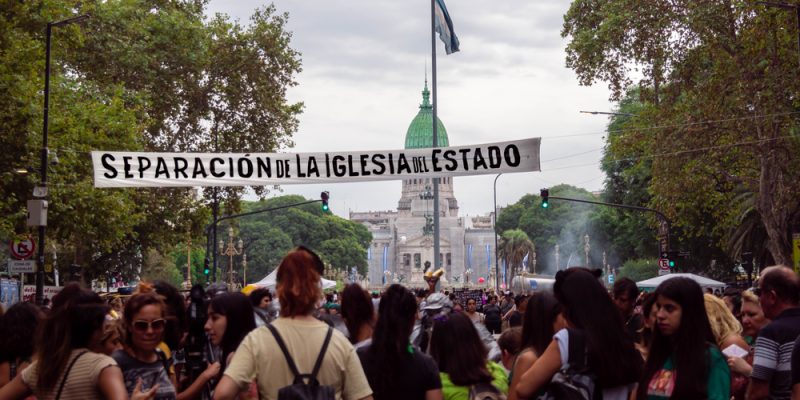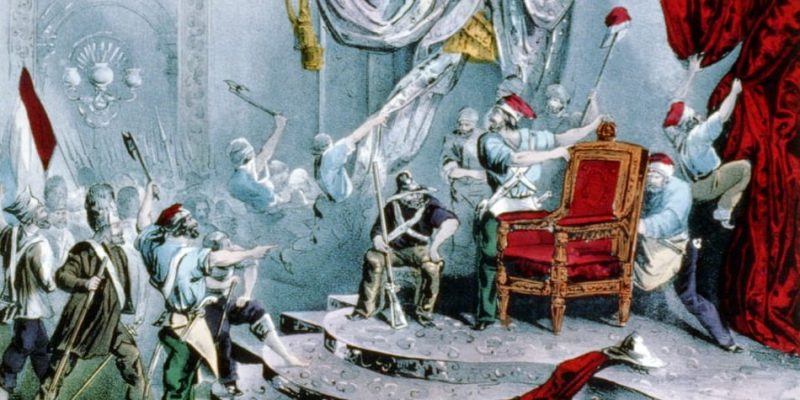We explain what a secular State is, its characteristics and differences with a non-denominational State. Also, the history of secularism.

What is a secular State?
A secular state is a state organization whose Constitution does not grant any religion official cult status . This means that the State does not have any religious identity nor is it subject to the authorities of any religion, and does not promote any specific cult. In addition, it allows freedom of worship, that is, each citizen can profess his or her religion or belief without any type of impediment or censorship, as long as he or she does not transgress any law.
In secular states There is a separation between religion and state or in countries with a Christian tradition, between Church and State. This means that religion is considered an intimate and personal matter of citizens, in which the State has no concern.
A secular state It is the complete opposite of a confessional state in which a specific confession is recognized as official and the religious institution plays an important political role in the organization and decisions of the State. However, this does not mean that secular States are atheistic, as were certain communist regimes that prohibited and persecuted any religious manifestation, but rather that they are secular, since they deal only with material matters (political, economic, legal and social).
Key points
- A secular State is one that does not recognize any religion as official or promote any specific cult.
- It is based on the separation between religion and the State, and allows freedom of worship for its citizens.
- Secularism was born from liberalism, and the first secular states emerged in France and the United States following the liberal revolutions of the late 18th century.
- It differs from the non-denominational State in that it does not recognize an official religion but can financially support religious institutions.
Characteristics of a secular State
Secular States are characterized by:
- They have a clear separation between the affairs of the State (bureaucracy, political leadership, civil management, the exercise of justice, among others) and religious, mystical and faith matters. This means that these two spheres of life do not mix (as long as the exercise of faith does not violate secular laws).
- Its Constitution does not consider any religion as “official” or “state”, and does not address the private beliefs of its citizens, beyond enshrining freedom of worship and speaking out against religious discrimination.
- Its citizens are considered equal before the law, without distinction of their religious identity or spiritual practices.
- They have a secular public education system, far from any religious consideration or doctrine, although some States considered secular partially subsidize religious education.
- The Church and religion can have an important moral role in society, but they cannot intervene in the political, economic, social or legal decision-making of the country.
- In some cases, the secularism of the State is not total, as occurs in certain countries with States considered secular in which the calendar of national festivities includes celebrations of the religious calendar (such as Easter and Christmas), and in which many ecclesiastical officials are considered public workers and receive remuneration from the State.
History of secularism

The secular State is a consequence of liberalism, a political, philosophical and social current that emerged in Europe in the 17th and 18th centuries, and which aspired to overcome the world of the Old Regime, where the majority of States were confessional and governed by a absolutist monarch. The liberal revolutions in the United States and France at the end of the 18th century founded the first secular states .
The concept of the “secular State” emerged in France in the 19th century, to refer to the separation between the institutions of the State and the Catholic Church that was made possible thanks to the ideas of the Enlightenment and, especially, the liberal revolutions. The idea of the secularization of the State, that is, its neutrality in religious matters, went hand in hand with the reduction of the political power of the Church. and its influence on national destinies, since the clergy was for centuries an ally of the monarchies and the noble and conservative classes.
At the beginning of the 21st century, Secularism is the prevailing norm in the majority of the 193 countries of the United Nations (UN) and is considered a key feature in the construction of a modern State. However, many confessional states still exist, especially in the Islamic world and in some Western nations of Catholic and Protestant tradition.
On the other hand, some States with secular characteristics offer support to certain religious institutions, which is why they are sometimes considered non-denominational States and not secular States. In addition, some religious groups can exert pressure on various governments, even though they have secular constitutions.
Examples of secular states in the 21st century
Some examples of secular states or states without official religion today are:
- Albania
- Germany
- Australia
- Belgium
- Benin
- Brazil
- Cameroon
- Chili
- Cuba
- Spain
- USA
- France
- Honduras
- India
- Japan
- Kenya
- Luxembourg
- Mexico
- Nepal
- Niger
- Senegal
Secular state and non-denominational state
A non-denominational State is one that does not officially adhere to any religion, but can maintain agreements and grant economic aid to religious institutions, as long as this does not influence the political course of the country. Both the secular State and the non-denominational State are contrary to the confessional or religious State, but are distinguished from each other in the degree of separation they have from ecclesiastical matters .
Thus, a total separation between the State and religious institutions and affairs is expected from a secular State, while a non-denominational state allows itself the financing or support of certain religious organizations but it does not imply the submission of the State to the will of the religious authorities or to their precepts.
References
- Adame Goddard, J. (2012). Secular state and religious freedom. In Moreno Bonett, M and Álvarez González, RM (Coords.), The secular State and human rights in Mexico: 1810-2010 (volume I, pp. 27-45). National Autonomous University of Mexico. https://archivos.juridicas.unam.mx/
- Blackford, R. (2012). Freedom of Religion and the Secular State. Wiley-Blackwell.
- Temperman, J. (2010). State-Religion Relationships and Human Rights Law. Towards a Right to Religiously Neutral Governance. Brill.
- US Department of State, Office of International Religious Freedom. (2023). 2022 Report on International Religious Freedom. https://www.state.gov/
- World Population Review (2024). Secular Countries 2024. https://worldpopulationreview.com/





